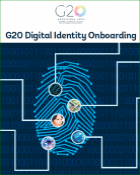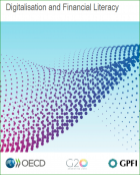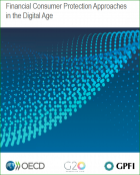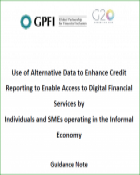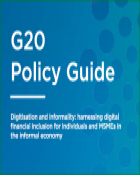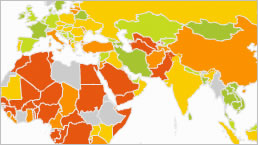Report | Oct 4, 2018
According to the 2017 Global Findex Survey, the lack of documentation was the primary barrier to access to financial services cited by 26 percent of unbanked individuals in low income countries. Beyond extending legal ID in order to address these gaps, the introduction of a legal, digital ID could potentially increase the adoption of financial services, furthering the financial inclusion agenda and supporting development goals.
Report | Jul 25, 2018
The digitalisation of financial products and services, and the consequent need to strengthen digital financial literacy has become an important component of the global policy-making agenda. This guidance aims to identify and promote effective initiatives that enhance digital and financial literacy in light of the unique characteristics, advantages, and risks of digital financial services and channels.
Report | Jul 25, 2018
In an increasingly digital environment for financial products and services with the potential to support greater financial inclusion and inclusive growth, the need for effective financial consumer protection is more important than ever. At the same time, the policies and approaches developed and adopted by financial consumer protection authorities need to evolve and adapt in line with the environment.
Report | Jul 25, 2018
This Policy Guide provides practical policy recommendations on how countries can adopt and leverage the use of alternative data for credit reporting, while mitigating the risk inherent in the use of such data. The matrix below provides a list of impediments and the ICCR policy recommendations.
Report | Jul 24, 2018
Access to and use of financial services plays a critical role in supporting inclusive and sustainable development. Despite remarkable progress in the financial inclusion agenda, large segments of the population remain excluded from the formal financial system. Many financially-excluded individuals and firms are found in the informal economy. Digitisation offers an unprecedented opportunity to address eligibility and affordability barriers to formal financial inclusion faced by informal individuals and firms. In particular, digitisation can (i) facilitate identity verification, (ii) promote digital payments and (iii) improve the information environment. However, to fulfil its potential digitisation also requires attention to (iv) financial consumer protection and financial literacy. The G20
Report | Jul 12, 2018
The GPFI Work Plan summarizes the key outputs for the GPFI and its Subgroups.
Report | Jul 12, 2018
Subgroup’s areas of focusThe Subgroup focuses on two action areas under the 2017 FIAP: (1) Improve the capacity of public authorities and other relevant stakeholders to develop, implement, and rigorously evaluate financial literacy and consumer protection initiatives and policies; (2) Promote consumer protection and financial education effective practices for financial products and services, including existing and emerging technologies, with emphasis on underserved and vulnerable groups.
Report | Jul 12, 2018
Objective of the subgroup The objective of the FCPFL Subgroup for the next five years is to build the capacity of developing and emerging economies to implement audience-appropriate, evidence-based financial consumer protection and financial literacy programs. Additionally, the Subgroup will identify best practices, emanating from the public, private, and NGO sectors, in financial consumer protection and education policies that support the safe use of digital financial products and services. The Subgroup will continue to encourage and support efforts to improve financial education delivery, increase financial literacy, and promote effective consumer protection measures for the poor, with emphasis on vulnerable groups, including women, youth, migrants, the elderly, people living in rural
Report | Jun 27, 2018
The GPFI Forum will be hosted on a back to back basis with the second GPFI Plenary meeting, serving as an opportunity to broadcast the importance of technology as a booster of digital financial services. The purpose of the GPFI Forum is to highlight on avant-garde topics regarding digitisation for members and stakeholders to join in discussions on how these issues impact the financial inclusion agenda from a policy perspective. It would also be a space to hear country cases experiences. The two-day GPFI Forum will consist of time blocks covering different subjects that involve how the new technologies may influence the development of financial inclusion.Date and Place The GPFI Forum will take place on Tuesday 3rd and Wednesday 4th of July in Riyadh, Saudi Arabia. Last updated: 27 June 2018
Report | May 18, 2018
The objective of the FCPFL Subgroup for the next five years is to build the capacity of developing and emerging economies to implement audience-appropriate, evidence-based financial consumer protection and financial literacy programs.


